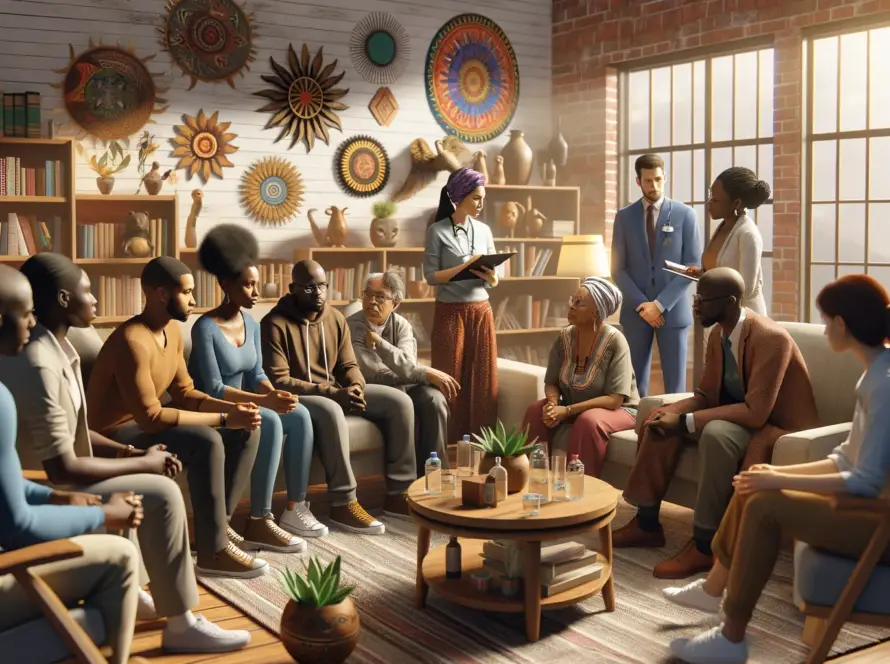
Seeking therapy can be a daunting process, and it can be even more challenging for black individuals who are looking for therapy options that are culturally competent and inclusive. Therapy can be a valuable tool for managing mental health, and it’s essential to find a therapist who understands and respects the unique experiences of people of color. In this article, we explore therapy options for black individuals, the importance of finding culturally competent therapists, and ways to overcome barriers to seeking therapy.
Key Takeaways
- It’s essential for black individuals to find culturally competent therapy options that understand their unique experiences
- Mental health disparities exist within the black community, and it’s essential to access mental health resources that cater to black individuals’ needs
- Black individuals can find therapists who specialize in providing therapy specifically for people of color through various avenues, such as online directories and community organizations
- Incorporating culturally relevant practices in therapy approaches can enhance the therapeutic process for black individuals
- Online therapy and teletherapy provide accessible and convenient therapy options for black individuals
The Importance of Culturally Competent Therapy
For people of color seeking therapy, finding a therapist who understands their unique experiences and challenges is crucial to a successful therapeutic journey. Culturally competent therapy recognizes that cultural elements, such as ethnicity, nationality, and race, can influence mental health and shapes the therapeutic process.
Therapy for people of color must be inclusive, and therapists need to acknowledge and respect cultural backgrounds, beliefs, and values that shape their clients’ experiences. Without cultural awareness and knowledge, therapy could be ineffective, and clients might feel misunderstood or even stigmatized.
Inclusivity in therapy not only means that a therapist understands their client’s background but also acknowledges how systemic oppression and discrimination adversely affect their mental health. When seeking therapy, it is essential to find a therapist who brings an intersectional approach, recognizes the multiple identities that shape your experiences, and integrates them into their work.
Understanding Mental Health Disparities in the Black Community
Black individuals face unique mental health challenges due to historical and societal factors that have contributed to longstanding disparities in mental health outcomes. According to the National Alliance on Mental Illness (NAMI), black individuals are:
| MORE LIKELY TO: | LESS LIKELY TO: |
|---|---|
| Experience severe psychological distress | Receive mental health treatment |
| Report symptoms of a mental health condition | Have access to mental health resources |
This highlights the need for mental health resources that are specifically designed to address the unique needs and concerns of the black community. Accessible black mental health services can help bridge the gap in services and eliminate disparities.
Finding Therapists Who Specialize in Black Mental Health
If you’re seeking therapy as a black individual, it’s essential to find therapists who understand and respect your cultural experiences. Here are some tips for finding therapy options that cater specifically to black individuals:
1. Utilize Online Directories
Several online directories can help you find therapists who specialize in black mental health services. Some examples include the “Therapy for Black Girls” directory and “The Black Therapist Network”, which can connect you with black mental health professionals in your local area.
2. Check with Community Organizations
You can also check with community organizations that provide mental health services for black individuals. These organizations may have information on available therapy options or be able to connect you with therapists that specialize in black mental health services. Examples include the “Black Women’s Health Imperative” or “National Queer and Trans Therapists of Color Network.”
3. Consider Your Insurance Plan
If you have insurance, check with your insurance provider to see if they cover mental health services for black individuals. Ask for a list of therapists who specialize in black mental health services and ensure they are within your insurance’s network.
4. Look for Culturally Competent Therapists
When selecting a therapist, it’s crucial to find someone who is culturally competent. Culturally competent therapists understand and respect the unique experiences of black individuals. Look for therapists who have experience working with black individuals and have specialized training in cultural competence.
By following these tips, you can find therapy options that cater specifically to black individuals. Remember to take your time, do your research, and consider your individual needs and preferences when selecting a therapist.
Culturally Competent Therapy Approaches
When seeking therapy as a black individual, it is important to find therapists who provide culturally competent therapy. This means that the therapist has an understanding of the unique experiences and cultural factors that shape the lives of black individuals and incorporates these elements into the therapy approach.
There are several therapy approaches and techniques that are culturally competent and effective for black individuals. One example is Afrocentric therapy, which aims to connect black individuals with their cultural identity and promotes a sense of empowerment and self-worth. Other approaches may incorporate spirituality or religion, as these can play significant roles in the lives of black individuals.
It is important for black individuals to seek therapy that aligns with their unique cultural experiences. By doing so, they can feel comfortable and understood in therapy sessions, which can enhance the therapeutic process and lead to positive outcomes.
Intersectionality and Therapy
Black individuals often experience unique challenges and stressors that are influenced by multiple factors, including race, gender, sexuality, and socioeconomic status. These multiple identities intersect and impact their mental health in various ways.
That’s why it’s important to seek therapy that recognizes and addresses these intersectional experiences. Intersectional therapy takes into account the different social factors that shape a person’s experiences and provides a framework for therapists to address them in therapy.
Therapists who specialize in intersectional therapy can help black individuals navigate the complexities of their identity and mental health, and provide a safe and supportive space for healing and growth.
Benefits of Intersectional Therapy:
| Benefits | Description |
|---|---|
| Inclusivity | Intersectional therapy creates a safe and inclusive space for black individuals to explore their experiences and emotions without fear of judgment or assumptions |
| Empowerment | By addressing the multiple social factors that impact their mental health, black individuals can gain a greater sense of empowerment and agency in their lives |
| Cultural Relevance | Intersectional therapy offers therapy approaches that are culturally relevant and tailored to the unique experiences of black individuals |
Don’t hesitate to seek intersectional therapy if you’re a black individual seeking therapy. It can provide you with a transformative therapeutic experience that honors and addresses all the aspects of your identity.
Online Therapy and Teletherapy Options for Black Individuals
Amidst the pandemic, online therapy and teletherapy have become increasingly popular options for individuals seeking mental health support from the comfort of their own homes. These options can be especially beneficial for black individuals facing barriers to accessing in-person therapy such as transportation or scheduling conflicts.
There are several reputable platforms that offer online therapy services with licensed therapists who specialize in providing therapy for people of color. Some of these platforms may accept insurance or offer affordable pricing options, making therapy more accessible for those with financial concerns.
Teletherapy, or therapy conducted over the phone or through video conferencing, is another option for individuals who may not have access to reliable internet or prefer a more immediate form of communication. This type of therapy can still provide the benefits of traditional therapy while eliminating geographic barriers and increasing flexibility.
Ultimately, no matter what therapy option you choose, it’s important to prioritize your mental health and find a therapy option that works best for you. Below are some resources to help you find reputable online therapy and teletherapy options:
“CredibleMind” – A platform that provides access to virtual therapy sessions for black, indigenous and people of color (BIPOC).
“E-therapy Cafe” – A teletherapy platform that matches clients with licensed therapists who specialize in providing culturally competent therapy to people of color.
Remember, finding culturally competent therapy tailored to your unique needs as a black individual is possible and an important step towards healing and growth.
Support Groups and Community Resources
Black individuals seeking therapy need not feel alone in their journey towards better mental health. There are various support groups and community resources available to provide them with the help they need. Being surrounded by like-minded individuals and receiving support from people going through similar experiences can make a tremendous difference.
A great way to connect with others is by attending support groups and workshops specifically designed for black individuals. These groups can create a safe space where individuals can express themselves without fear of judgment, and they can also provide valuable insight and encouragement.
Many community organizations and mental health clinics offer services for black individuals, including mental health screening, therapy sessions, and psychiatric care. These services are tailored to the unique experiences and cultural backgrounds of black individuals, making them an excellent option for those seeking therapy specifically tailored to their needs.
Examples of Support Groups and Community Resources
| Organization | Type of Service | Contact Information |
|---|---|---|
| The Loveland Foundation | Therapy sessions for black women and girls | https://thelovelandfoundation.org/ |
| The Black Men’s Therapy Group | Support group for black men | https://www.blackmenheal.org/therapy-group |
| NAMI Urban Los Angeles | Support groups and workshops for black individuals with mental illness | http://namiurbanla.org/ |
These are just a few examples of the many organizations and resources available to black individuals seeking therapy. Make use of these resources, and do not hesitate to reach out for support when it is needed.
Overcoming Barriers to Seeking Therapy
Seeking counseling can be challenging for black individuals due to various barriers. These barriers can include lack of inclusivity in therapy, financial concerns, and systemic barriers. The following strategies can help overcome these obstacles and access appropriate therapy options:
1. Find Culturally Competent Therapists
Many black individuals face difficulties in finding therapists who can understand and respect their unique experiences. Therefore, it is essential to find culturally competent therapists who can provide therapy options specifically tailored for black individuals. The therapy options for black individuals directory is a great resource for finding such therapists.
2. Address Stigma Surrounding Mental Health
Mental health stigma can prevent black individuals from seeking therapy due to fear of judgment and discrimination. It is crucial to address this stigma by openly discussing the importance of mental health and encouraging others to seek therapy without judgment.
3. Utilize Community Resources
Many community organizations and mental health services provide therapy for black individuals, oftentimes free or at a reduced cost. Utilizing these resources can make therapy more accessible for those who may have financial concerns.
4. Consider Online or Teletherapy Options
Online therapy and teletherapy options can make therapy more accessible for those who may not have options nearby or may have transportation barriers. These options can also be more cost-effective for those on a tight budget.
By overcoming barriers to seeking therapy, black individuals can access the diverse therapy options and find appropriate counseling for black individuals, which is essential in fostering mental wellness and positive long-term outcomes.
Conclusion
In conclusion, navigating therapy options for black individuals can be a challenging process, but it is crucial for promoting mental health and well-being. By seeking culturally competent therapy options and mental health resources for black individuals, black therapy seekers can find professionals who understand their unique experiences and challenges.
It is essential to recognize the mental health disparities that exist within the black community and seek out therapy options that address these issues. This includes finding therapists who specialize in providing therapy for black individuals, utilizing culturally competent therapy approaches, and seeking therapy that recognizes the intersectionality of one’s experiences.
Fortunately, there are many diverse therapy options available for black individuals, including online therapy and teletherapy options. Additionally, support groups and community resources can provide valuable mental health services for black individuals seeking therapy.
As we work to overcome barriers to seeking therapy, it is important to remember that healing and growth are attainable through therapy. By prioritizing inclusivity in therapy and finding therapy options that align with one’s unique cultural experiences, we can promote positive mental health outcomes for black individuals.
If you or someone you know is seeking therapy options for black individuals, don’t hesitate to reach out for help. With the right support and resources, we can all work towards achieving optimal mental health and well-being.
FAQ
What is culturally competent therapy?
Culturally competent therapy is a therapeutic approach that takes into account the cultural background, experiences, and values of the client. It involves therapists having an understanding of the unique challenges faced by individuals from different cultural backgrounds and integrating this awareness into their therapeutic practices.
Why is it important for black individuals to seek culturally competent therapy?
It is important for black individuals to seek culturally competent therapy because it ensures that their unique experiences, challenges, and cultural background are understood and respected. Culturally competent therapy creates a safe and supportive space for black individuals to address their mental health concerns and promotes a more effective therapeutic process.
How can I find therapists who specialize in black mental health?
To find therapists who specialize in black mental health, you can start by searching online directories or websites that specifically promote therapists who cater to the needs of black individuals. Additionally, you can reach out to local community organizations or seek recommendations from friends, family, or other healthcare professionals.
What are some culturally competent therapy approaches for black individuals?
Culturally competent therapy approaches for black individuals can include using a strengths-based perspective, incorporating cultural rituals and practices, and acknowledging the impact of systemic racism on mental health. Therapists may also utilize techniques such as narrative therapy, mindfulness, or cognitive-behavioral therapy, which can be tailored to address the specific needs and experiences of black individuals.
Why is intersectionality important in therapy for black individuals?
Intersectionality recognizes that individuals hold multiple social identities and that these identities intersect and interact to shape their experiences. In therapy for black individuals, understanding intersectionality is crucial because it acknowledges the influence of race, gender, sexuality, and other identities on mental health. By exploring and addressing these intersecting identities, therapy can better meet the unique needs of black individuals.
What are online therapy and teletherapy options for black individuals?
Online therapy and teletherapy are virtual forms of therapy that allow individuals to access mental health services remotely. They provide convenient and accessible options for black individuals who may have limited transportation or face other barriers to in-person therapy. Several reputable platforms and therapists offer online therapy services specifically tailored to the needs of black individuals.
Are there support groups or community resources for black individuals seeking therapy?
Yes, there are support groups and community resources available for black individuals seeking therapy. These resources can be found through local community organizations, online directories, or by reaching out to mental health professionals who specialize in black mental health. These support groups and community resources offer additional avenues for connecting with others who share similar experiences and can provide valuable support.
What are some barriers that black individuals may face when seeking therapy?
Black individuals may face several barriers when seeking therapy, including stigma surrounding mental health, limited financial resources, and systemic barriers within the healthcare system. Overcoming these barriers often requires breaking down the stigma, exploring affordable therapy options, seeking out culturally competent therapists, and advocating for equitable access to mental health services.



